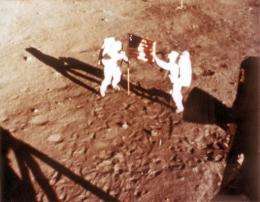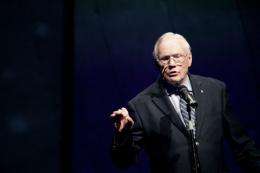Neil Armstrong urges return to the Moon

Neil Armstrong has urged a return to the Moon to train for missions to Mars as the United States contemplates the future of its space programme following the end of the shuttle era.
The first man to walk on the Moon is due to address the US Congress on new directions for NASA in coming weeks.
He has previously criticised US President Barack Obama for being "poorly advised" on space matters and said it was "well known to all that the American space programme is in some chaos at the present time, some disarray".
"There are multiple opinions on which goals should be the most important and the most pressing," he told a function in Sydney late Wednesday.
The US shuttle programme came to an end last month with the Atlantis cruising home for a final time, 42 years after Armstrong became the first person to set foot on the Moon as part of the Apollo 11 mission.
Critics have assailed NASA for lacking focus, with no next-generation human space flight mission to replace the shuttle programme.
Now 81, Armstrong said the agency had become a "shuttlecock" for the "war of words" between the executive, legislative and congressional arms of US government.
"It’s my belief given time and careful thought and reasoning we will eventually reach the right goal, I just hope we do it fairly quickly," he said.
The normally private and reserved space veteran said Mars should be the next frontier for exploration but urged more missions to the Moon as the vital next step.

"I do favour going to Mars but I believe it is both too difficult and too expensive with the technology we have available at the current time," he said.
"I favour returning to the Moon. We made six landings there and explored areas as small as a city lot and perhaps as large as a small town. That leaves us some 14 million square miles that we have not explored."
Armstrong said working on the Moon would allow scientists to practise "a lot of the things that you need to do when you are going further out in the solar system" while maintaining relatively close contact with Mission Control.
Communication is the major problem for trips to Mars, he added, with the relay of a message between Earth and the Red Planet delayed by about 20 minutes, compared with 1.5 seconds between here and the Moon.
"Before you get an answer to your question almost an hour’s gone by, so it’s hard for Mission Control to be involved in a meaningful way helping you with that situation," he said.
"That's going to make a very difficult challenge for the early Mars missions to solve these kinds of delay sort of problems.
"I do believe that we will solve them in time, we’ll contrive a way to do that safely but we can't do it right now."
Travel time is also a major concern, with the quickest journey of two months only possible when Mars is closest to Earth -- when it also happens to be spinning most rapidly, meaning massive amounts of fuel are required to land.
"The best time to go to Mars is when it’s on the opposite side of the Sun to you, as far away as it can get, and that takes the least fuel, but it also takes about seven months one way, which is packing a lot of sandwiches," he said.
"And by the time you get there Earth has moved and it's no longer in a proper position to come back, so you have to wait around for a couple of years until Earth gets in the right position."
Armstrong said Mars was a "worthy challenge" but it was expensive, time-consuming and carried substantial risks not faced in the lunar programme, predominantly to do with radiation.
(c) 2011 AFP




















